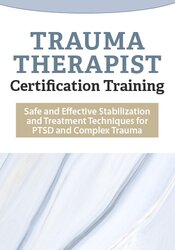
×

Our comprehensive certification program is designed to equip you with the skills and techniques to become the trauma therapist clients desperately need.
Over 3 intensive days, you’ll delve deep into the multifaceted world of trauma treatment, unraveling its complexities one thread at a time. From single incident trauma to complex traumas, you’ll cover it all, including traumas stemming from sexual assault, childhood abuse, domestic violence, war, and more.
By immersing yourself in our transformative curriculum, you’ll not only get a profound understanding of the spectrum of traumatic experiences – but leave knowing exactly how to confidently work with them in the clients you see in your office each day.
You’ll explore a wide range of evidence-based treatment modalities and a diverse array of issues that arise in clinical practice, equipping you with the tools you need to provide tailored treatment to each unique case…
…so your clients can overcome their traumatic pasts and reclaim their lives.
Taught by trauma expert, clinical psychologist and author Dr. Heidi Green, you’ll leave this course ready to offer evidence-based treatment to survivors, whether they meet criteria for a trauma-related clinical diagnosis or not.
Join Dr. Green as she shows you how you can:
PLUS when you complete this training, you’ll be eligible to become a Certified Clinical Trauma Professional (CCTP) through Evergreen Certifications at no additional cost – letting clients know you’re ready to guide them toward lasting healing and resilience.
And with 3-months of FREE group mentorship calls available to you after the training ends, you can join Dr. Green to review skills, discuss cases and get the ongoing support you need to take your trauma treatment to the next level.
Don’t wait – start your journey today and register now!
CERTIFICATION MADE SIMPLE!
Attendees will receive documentation of CCTP designation from Evergreen Certifications 4 to 6 weeks following the program.
*Professional standards apply. Visit www.evergreencertifications.com/CCTP for professional requirements.
All members of the PESI, Inc. planning committee have provided disclosures of financial relationships with ineligible organizations and any relevant non-financial relationships prior to planning content for this activity. None of the committee members had relevant financial relationships with ineligible companies or other potentially biasing relationships to disclose to learners. For speaker disclosures, please see the faculty biography.
Continuing education credit information is coming soon for this live webcast.

Dr. Heidi Green, is a highly respected clinical psychologist and trauma therapist who trained at a world-renowned center for trauma and addiction treatment, Psychological Counseling Services, in Scottsdale, Arizona. Now in private practice, Dr. Green has become a leading expert in trauma healing and personal empowerment. She’s made national television appearances on “The List” as a trusted mental health authority and is the author of The Path to Self-Love and World Domination in which she captures her journey from insecurity and self-doubt to emotional recovery and self-acceptance with humor, humility, compassion, and a saucy spirit. Her therapeutic specialties include trauma, self-esteem, codependency, body image, boundaries, healthy sexuality, depression, anxiety, crisis intervention, and more. Using some of today’s most in-demand evidence-based treatments like DBT and EMDR, Dr. Green is recognized for her remarkable ability to connect with individuals and guide them on a transformative journey of self-discovery, personal growth, and improved well-being.
Speaker Disclosures:
Financial: Dr. Heidi Green maintains a private practice and receives royalties as a published author. She receives a speaking honorarium and recording royalties from PESI, Inc. She has no relevant financial relationships with ineligible organizations.
Non-financial: Dr. Heidi Green is a member of the American Psychological Association.
For live CE credit, you must watch the live webcast in its entirety at its scheduled time and complete the CE quiz and evaluation within one week. You will have access for 90 days after the program for review.
Please note: Each day there will be a 70-minute lunch and two 15-minute breaks; one in the morning and one in the afternoon. Lunch and break times will be announced by the speaker and at their discretion. A more detailed schedule is available upon request.
Visit our FAQ page at https://www.pesicanada.ca/faq or contact us at https://www.pesicanada.ca/contact-us.
Introduction to Trauma: Setting the Stage for Transformative Treatment
Developmental Trauma: What You Need to Know
Grounding and Regulation Techniques: Effectively Reduce Distress, Regulate Intense Emotions, and Create Stability in Clients
Single-Incident Trauma & Stress-Related Disorders
Cognitive Approaches to Trauma Therapy
Somatic Approaches to Trauma Therapy: 4 Keys to Unlocking the Body’s Wisdom for Trauma Healing
IFS and Narrative Therapy to Process Emotional Pain
EMDR: A Rapid, Safe and Proven Trauma Treatment
Trauma Subgroups
Cultural Sensitivity in Trauma Treatment: Nurturing Trust and Healing Across Diverse Communities
Transforming Care through Trauma- Informed Practices: Nurturing Self-Worth, Self-Compassion, and Therapist Resilience
Satisfaction Guarantee
Your satisfaction is our goal and our guarantee. Concerns should be addressed to info@pesicanada.com.
Please wait ...